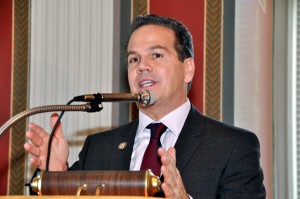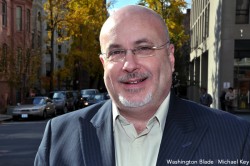National
Gay House, Senate candidates running strong
Numbers show Baldwin, others winning fundraising battles

Gay and lesbian candidates for the U.S. House and Senate are competitive with — and in some cases besting — their straight opponents when it comes to raising money.
Fundraising numbers for the fourth quarter of 2011 and the year in total became public earlier this month after candidates submitted their campaign filings in accordance with federal election law.
Rep. Tammy Baldwin, who’s seeking to become the first openly gay U.S. senator, made a particularly impressive showing in the final quarter in her bid to represent Wisconsin in the Senate by taking in $1.16 million.
The fourth quarter haul means the Democrat and seven-term House member raised $2.5 million last year for her Senate campaign. She has $1.8 million in cash on hand.
Phillip Walzak, a Baldwin spokesperson, said the number demonstrates the strength of her campaign.
“These figures demonstrate the strength of Tammy’s grassroots campaign, and the depth of support for her message to stand up for our shared values, and put the people ahead of right-wing radicals and corporate special interests,” Walzak said.
Nathan Gonzales, editor of the Rothenberg Political Report, said Baldwin won’t “lose the Senate race because she doesn’t have enough money,” although it remains a toss-up and could be “one the top general elections in the country.”
Gonzales added he doesn’t think Baldwin’s sexual orientation will factor into the race heading into the general election.
“I see Republicans talking about her just being from Madison and how being a liberal Democrat from Madison puts her out of touch with the rest of the state rather than making her sexuality an issue,” Gonzales said.
Republican candidates in the race don’t come close to Baldwin in fundraising. Former Wisconsin Gov. Tommy Thompson raised $657,000 and has $544,000 in cash on hand. Former congressman and gubernatorial candidate Mark Neumann raised $826,000 and has $552,000 in cash on hand.
Denis Dison, spokesperson for the Gay & Lesbian Victory Fund, said Baldwin has “lapped everybody in the field” of Republicans.
“They’re going to be spending that money in the primary,” Dison said. “This is going to be a pretty ugly primary on the Republican side. They’re really going to have to spend all the way to win their nomination.”
Democrat Mark Takano, a gay public school teacher and member of the Riverside Community College District’s Board of Trustees, is also on top in fundraising for the race to represent California’s newly created 41st congressional district — although by a much slimmer margin.
Takano has raised $288,000 in total and has $212,000 in cash on hand. The Republican in the race, Riverside County Supervisor John Tavaglione has raised $275,000 and has $177,000 in cash on hand.
Gonzales said he thinks the race will be “competitive” in the general election, but added that Takano has the advantage.
“I think Republicans looking at numbers think there may be an opportunity there in a mid-term election,” Gonzales said. “In the presidential race where the president is going to do very well in the state, overall, I think, Takano has the edge.”
Rep. David Cicilline, whom many thought would face a tough re-election campaign because of his unpopularity in the polls, is also outraising his Republican opponents and faces no Democratic challenger.
The Rhode Island Democrat has raised a total of $949,000 and has $518,000 in cash on hand. Republican businessman and former law enforcement official Brendan Doherty has raised $617,000 and has $482,000 in cash on hand.
Cicilline nose-dived in the polls last year because he was seen as less than forthcoming about the troubled finances of Providence, R.I., during his tenure as mayor prior to his election to the U.S. House.
The city of 178,000 faced a $110 million projected budget deficit and the rainy-day fund diminished from more than $22.3 million three years ago to less than $221,000, according to a report last year from Politico.
Gonzales said Cicilline’s problem in the general election won’t be money, but his approval rating, and predicted the race will be competitive even though Rhode Island is considered a Democratic state.
“If voters are focused on Cicilline’s record in Congress, then he’ll probably be fine for re-election, if they’re focused on his time as mayor and how they feel about how he described his tenure when he was running for Congress, then his re-election becomes a much dicier proposition,” Gonzales said.
Dison said he thinks Cicilline will do better than expected in the fall because his district was altered during the redistricting process to become even more Democratic.
“It would be very tough for a Republican to win that seat, unless there is a Republican wave out there,” Dison said. “But even in the last election, which was obviously a Republican wave, he won the district pretty handily.”
Other gay candidates aren’t ahead in fundraising, but are still doing well enough to remain competitive in their races.
Democrat Mark Pocan, a gay member of the State Assembly seeking the U.S. House seat Baldwin is vacating at the end of the year, has raised $274,000 and has $204,000 in cash on hand.
But it’s less money than David Worzala, another Democrat and the Dane County Treasurer. The candidate has raised $278,000 and has $252,196 in cash on hand.
Dison said Worzala’s lead in fundraising is misleading because the candidate loaned himself $170,000 and Pocan actually doubled and tripled what the other candidate raised.
“In terms of fundraising, he’s not doing very well raising money from individual donors, whereas Pocan is doing very well both from political action committees and individuals,” Dison said.
Dison added that Pocan’s endorsements are “overwhelming” and said every major Democrat and union has backed the gay candidate in the race.
Both candidates in this race are ahead of Kelda Roys, another Democratic member of the State Assembly, who’s raised $147,000 and has $128,828 in cash on hand.
In Massachusetts, gay Republican Richard Tisei, a former member of the Massachusetts Legislature and former candidate for lieutenant governor, is behind in his bid to unseat Rep. John Tierney (D-Mass.), but still has sizable funds.
Tisei has raised $311,559 and has $260,000 in cash on hand, but the incumbent Tierney, running in the strongly Democratic state, raised $577,545 and has $546,000 in cash on hand.
But looking just at the fourth quarter, Tisei bested Tierney in terms of fundraising. The Republican raised $311,558, almost all the fundraising for his campaign, in that quarter, while Tierney raised $161,105. Another Republican in the race, attorney and businessman Bill Hudak, dropped out of the race after the fundraising totals were announced.
Gonzales said the Democrat is favored and that it will be tough for any Republican, but said there may be a chance to do better than expected in the race.
“It’s still a Democratic district, but because of questions, ethical questions surrounding Tierney, or more specifically, his family, I think there’s an opportunity,” Gonzales said.
Dison said the seat became more winnable for a Republican with redistricting and the major question in the race is the extent to which the Republican Party rallies behind Tisei in the general election.
“The question will be whether the Republican committees here in town see that as a possible pick up, and if they do, then they’re going to get behind him and spend a lot of money there,” Dison said.
According to Politico, Tierney’s brother-in-law, Daniel Eremian, was convicted of federal racketeering charges related to his operation of an illegal offshore casino. Additionally, Patrice Tierney, the lawmaker’s wife and Eremian’s sister, last year was sentenced to one month in prison and five months of house arrest after pleading guilty to charges that she aided in the filing of her brother’s false tax returns.
Gay Rep. Jared Polis (D-Colo.) has raised $353,ooo and has $166,000 in cash on hand. He’s not expected to face serious competition in his heavily Democratic district.
Kansas
ACLU sues Kansas over law invalidating trans residents’ IDs
A new Kansas bill requires transgender residents to have their driver’s licenses reflect their sex assigned at birth, invalidating current licenses.

Transgender people across Kansas received letters in the mail on Wednesday demanding the immediate surrender of their driver’s licenses following passage of one of the harshest transgender bathroom bans in the nation. Now the American Civil Liberties Union is filing a lawsuit to block the ban and protect transgender residents from what advocates describe as “sweeping” and “punitive” consequences.
Independent journalist Erin Reed broke the story Wednesday after lawmakers approved House Substitute for Senate Bill 244. In her reporting, Reed included a photo of the letter sent to transgender Kansans, requiring them to obtain a driver’s license that reflects their sex assigned at birth rather than the gender with which they identify.
According to the reporting, transgender Kansans must surrender their driver’s licenses and that their current credentials — regardless of expiration date — will be considered invalid upon the law’s publication. The move effectively nullifies previously issued identification documents, creating immediate uncertainty for those impacted.
House Substitute for Senate Bill 244 also stipulates that any transgender person caught driving without a valid license could face a class B misdemeanor, punishable by up to six months in jail and a $1,000 fine. That potential penalty adds a criminal dimension to what began as an administrative action. It also compounds the legal risks for transgender Kansans, as the state already requires county jails to house inmates according to sex assigned at birth — a policy that advocates say can place transgender detainees at heightened risk.
Beyond identification issues, SB 244 not only bans transgender people from using restrooms that match their gender identity in government buildings — including libraries, courthouses, state parks, hospitals, and interstate rest stops — with the possibility for criminal penalties, but also allows for what critics have described as a “bathroom bounty hunter” provision. The measure permits anyone who encounters a transgender person in a restroom — including potentially in private businesses — to sue them for large sums of money, dramatically expanding the scope of enforcement beyond government authorities.
The lawsuit challenging SB 244 was filed today in the District Court of Douglas County on behalf of anonymous plaintiffs Daniel Doe and Matthew Moe by the American Civil Liberties Union, the ACLU of Kansas, and Ballard Spahr LLP. The complaint argues that SB 244 violates the Kansas Constitution’s protections for personal autonomy, privacy, equality under the law, due process, and freedom of speech.
Additionally, the American Civil Liberties Union filed a temporary restraining order on behalf of the anonymous plaintiffs, arguing that the order — followed by a temporary injunction — is necessary to prevent the “irreparable harm” that would result from SB 244.
State Rep. Abi Boatman, a Wichita Democrat and the only transgender member of the Kansas Legislature, told the Kansas City Star on Wednesday that “persecution is the point.”
“This legislation is a direct attack on the dignity and humanity of transgender Kansans,” said Monica Bennett, legal director of the ACLU of Kansas. “It undermines our state’s strong constitutional protections against government overreach and persecution.”
“SB 244 is a cruel and craven threat to public safety all in the name of fostering fear, division, and paranoia,” said Harper Seldin, senior staff attorney for the ACLU’s LGBTQ & HIV Rights Project. “The invalidation of state-issued IDs threatens to out transgender people against their will every time they apply for a job, rent an apartment, or interact with police. Taken as a whole, SB 244 is a transparent attempt to deny transgender people autonomy over their own identities and push them out of public life altogether.”
“SB 244 presents a state-sanctioned attack on transgender people aimed at silencing, dehumanizing, and alienating Kansans whose gender identity does not conform to the state legislature’s preferences,” said Heather St. Clair, a Ballard Spahr litigator working on the case. “Ballard Spahr is committed to standing with the ACLU and the plaintiffs in fighting on behalf of transgender Kansans for a remedy against the injustices presented by SB 244, and is dedicated to protecting the constitutional rights jeopardized by this new law.”
National
After layoffs at Advocate, parent company acquires ‘Them’ from Conde Nast
Top editorial staff let go last week

Former staff members at the Advocate and Out magazines revealed that parent company Equalpride laid off a number of employees late last week.
Those let go included Advocate editor-in-chief Alex Cooper, Pride.com editor-in-chief Rachel Shatto, brand partnerships manager Erin Manley, community editor Marie-Adélina de la Ferriére, and Out magazine staff writers Moises Mendez and Bernardo Sim, according to a report in Hollywood Reporter.
Cooper, who joined the company in 2021, posted to social media that, “Few people have had the privilege of leading this legendary LGBTQ+ news outlet, and I’m deeply honored to have been one of them. To my team: thank you for the last four years. You’ve been the best. For those also affected today, please let me know how I can support you.”
The Advocate’s PR firm when reached by the Blade said it no longer represents the company. Emails to the Advocate went unanswered.
Equalpride on Friday announced it acquired “Them,” a digital LGBTQ outlet founded in 2017 by Conde Nast.
“Equalpride exists to elevate, celebrate and protect LGBTQ+ storytelling at scale,” Equalpride CEO Mark Berryhill said according to Hollywood Reporter. “By combining the strengths of our brands with this respected digital platform, we’re creating a unified ecosystem that delivers even more impact for our audiences, advertisers, and community partners.”
It’s not clear if “Them” staff would take over editorial responsibilities for the Advocate and Out.
Federal Government
Two very different views of the State of the Union
As Trump delivered his SOTU address inside the Capitol, Democratic lawmakers gathered outside in protest, condemning the administration’s harmful policies.

As President Donald Trump delivered his State of the Union address inside the U.S. Capitol — touting his achievements and targeting political enemies — progressive members of Congress gathered just outside in protest.
Their message was blunt: For many Americans, particularly LGBTQ people, the country is not better off.
Each year, as required by Article II, Section 3 of the Constitution, the president must “give to the Congress Information of the State of the Union.” The annual address is meant to outline accomplishments and preview the year ahead. This year, Trump delivered the longest State of the Union in U.S. history, clocking in at one hour and 48 minutes. He spoke about immigration, his “law and order” domestic agenda, his “peace through strength” foreign policy doctrine, and what he framed as the left’s ‘culture wars’ — especially those involving transgender youth and Christian values.
But one year into what he has called the “Trump 2.0” era, the picture painted outside the Capitol stood in stark contrast to the one described inside.
Transgender youth
In one of the most pointed moments of his speech, Trump spotlighted Sage Blair, using her story to portray gender-affirming care as coercive and dangerous. Framing the issue as one of parental rights and government overreach, he told lawmakers and viewers:
“In the gallery tonight are Sage Blair and her mother, Michelle. In 2021, Sage was 14 when school officials in Virginia sought to socially transition her to a new gender, treating her as a boy and hiding it from her parents. Hard to believe, isn’t it? Before long, a confused Sage ran away from home.
“After she was found in a horrific situation in Maryland, a left-wing judge refused to return Sage to her parents because they did not immediately state that their daughter was their son. Sage was thrown into an all-boys state home and suffered terribly for a long time. But today, all of that is behind them because Sage is a proud and wonderful young woman with a full ride scholarship to Liberty University.
“Sage and Michelle, please stand up. And thank you for your great bravery and who can believe that we’re even speaking about things like this. Fifteen years ago, if somebody was up here and said that, they’d say, what’s wrong with him? But now we have to say it because it’s going on all over, numerous states, without even telling the parents.
“But surely, we can all agree no state can be allowed to rip children from their parents’ arms and transition them to a new gender against the parents’ will. Who would believe that we’ve been talking about that? We must ban it and we must ban it immediately. Look, nobody stands up. These people are crazy. I’m telling you, they’re crazy.”
The story, presented as encapsulation of a national crisis, became the foundation for Trump’s renewed call to ban gender-affirming care. LGBTQ advocates — and those familiar with Blair’s story — argue that the situation was far more complex than described and that using a single anecdote to justify sweeping federal restrictions places transgender people, particularly youth, at greater risk.
Equality Virginia said the president’s remarks were part of a broader effort to strip transgender Americans of access to care. In a statement to the Blade, the group said:
“Tonight, the president is choosing to double down on efforts to disrupt access to evidence-based, lifesaving care.
“Rather than allowing families and doctors to navigate deeply personal medical decisions free from federal interference — or allowing schools to respond with nuance and compassion without putting marginalized children at risk — the president is instead advocating for reckless, one-size-fits-all political control.
“At a time when Virginians are worried about rising costs, economic uncertainty, and aggressive immigration enforcement actions disrupting communities and families, attacking transgender young people is a blatant political distraction from the real challenges facing our nation. Virginia families and health care providers do not need Donald Trump telling them what care they do or do not need.”
For many in the LGBTQ community, the rhetoric inside the chamber echoed actions already taken by the administration.
Earlier this month, the Pride flag was removed from the Stonewall National Monument under a National Park Service directive that came from the top. Community members returned to the site, raised the flag again, and filed suit, arguing the removal violated federal law. To advocates, the move was symbolic — a signal that even the legacy of LGBTQ resistance was not immune.
Immigration and fear
Immigration dominated both events as well.
Inside the chamber, Trump boasted about the hundreds of thousands of immigrants detained in makeshift facilities. Outside, Democratic lawmakers described those same facilities as concentration camps and detailed what they characterized as the human toll of the administration’s enforcement policies.
Sen. Ed Markey (D-Mass.), speaking to the crowd, painted a grim picture of communities living in fear:
“People are vanishing into thin air. Quiet mornings are punctuated by jarring violence. Students are assaulted by ICE agents sitting outside the high school, hard working residents are torn from their vehicles in front of their children. Families, hopelessly search for signs of their loved ones who have stopped answering their phones, stop replying to text… This is un-American, it is illegal, it is unconstitutional, and the people are going to rise up and fight for Gladys Vega and all of those poor people who today need to know that the people’s State of the Union is the beginning of a long fight that is going to result in the end of Republican control of the House of Representatives and the Senate in the United States of America in 2026.”
Speakers emphasized that LGBTQ immigrants are often especially vulnerable — fleeing persecution abroad only to face detention and uncertainty in the United States. For them, the immigration crackdown and the attacks on transgender health care are not separate battles but intertwined fronts in a broader cultural and political war.
Queer leadership

After delivering remarks alongside Robert Garcia, Kelley Robinson, president of the Human Rights Campaign, took the stage and transformed the freezing crowd’s anger into resolve.
Garcia later told the Blade that visibility matters in moments like this — especially when LGBTQ rights are under direct attack.
“We should be crystal clear about right now what is happening in our country,” Garcia said. “We have a president who is leading the single largest government cover up in modern history, we have the single largest sex trafficking ring in modern history right now being covered up by Donald Trump and Pam Bondi In the Department of Justice. Why are we protecting powerful, wealthy men who have abused and raped women and children in this country? Why is our government protecting these men at this very moment? In my place at the Capitol is a woman named Annie farmer. Annie and her sister Maria, both endured horrific abuse by Jeffrey Epstein and Ghislaine Maxwell. As we move forward in this investigation, always center the survivors; we are going to get justice for the survivors. And Donald Trump may call this investigation a hoax. He may try to deflect our work, but our message to him is very clear that our investigation is just getting started, and we will we will get justice for these survivors.”
He told the Blade afterwards that having queer leaders front and center is itself an act of resistance.
“I obviously was very honored to speak with Kelley,” the California representative said. Kelley is doing a great job…it’s important that there are queer voices, trans voices, gay voices, in protest, and I think she’s a great example of that. It’s important to remind the country that the rights of our community continue to be attacked, and then we’ve got to stand up. Got to stand up for this as well.”
Robinson echoed that call, urging LGBTQ Americans — especially young people — not to lose hope despite the administration’s escalating rhetoric.
“There are hundreds of thousands of people that are standing up for you every single day that will not relent and will not give an inch until every member of our community is protected, especially our kids, especially our trans and queer kids. I just hope that the power of millions of voices drowns out that one loud one, because that’s really what I want folks to see at HRC. We’ve got 3.6 million members that are mobilizing to support our community every single day, 75 million equality voters, people that decide who they’re going to vote for based on issues related to our community. Our job is to make sure that all those people stand up so that those kids can see us and hear our voices, because we’re going to be what stands in the way.”
A boycott — and a warning
The list of Democratic lawmakers who boycotted the State of the Union included Sens. Ruben Gallego, Ed Markey, Jeff Merkley, Chris Murphy, Adam Schiff, Tina Smith, and Chris Van Hollen, along with dozens of House members.
For those gathered outside — and for viewers watching the livestream hosted by MoveOn — the counter-programming was not merely symbolic. It was a warning.
While the president spoke of strength and success inside the chamber, LGBTQ Americans — particularly transgender youth — were once again cast as political targets. And outside the Capitol, lawmakers and advocates made clear that the fight over their rights is far from over.




















